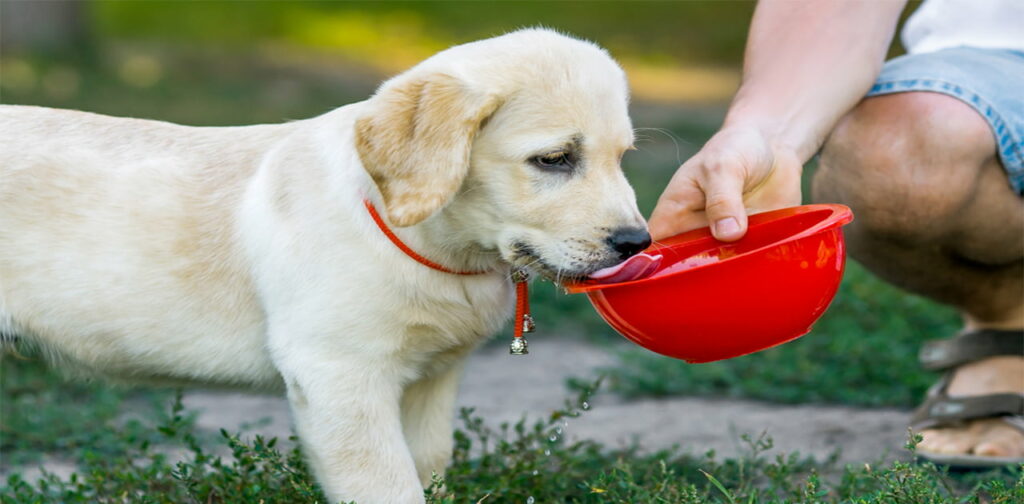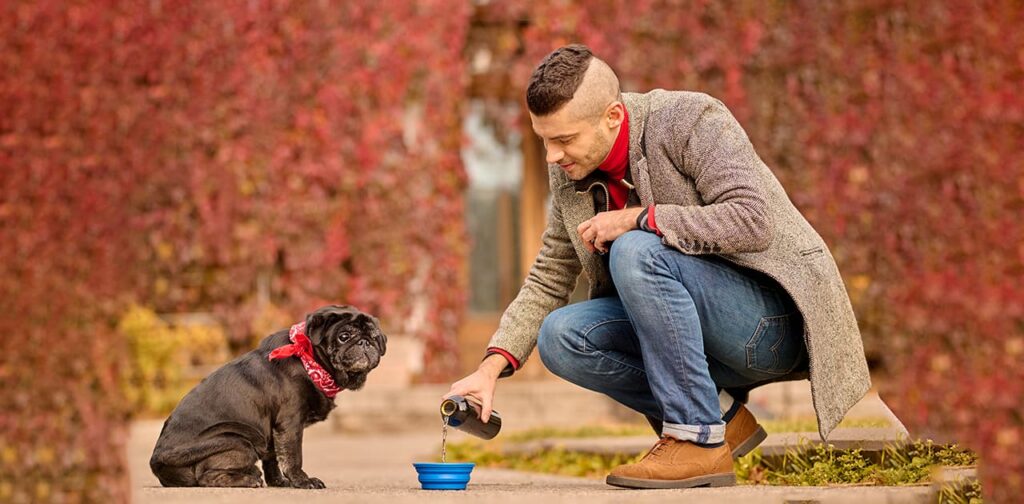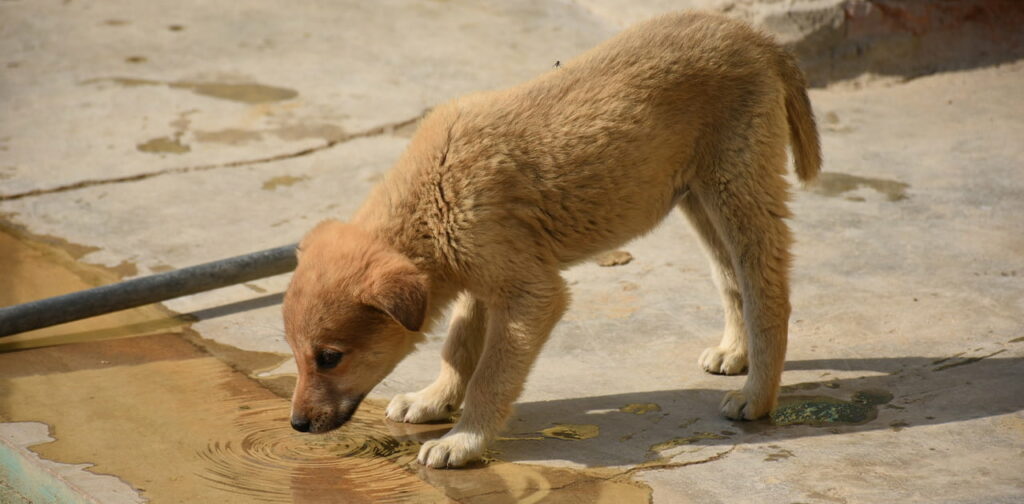Curious about your new furry friend’s hydration needs? Let’s dive into the crucial question: How much water should a puppy drink. Puppies need much more hydration in comparison to adult dogs.
Puppies typically need 0.5 to 1 ounce of water per pound according to their weight daily. Ensuring your little friend is getting enough hydration requires you to be aware of their needs.
Take a look at our blog article on how much water a puppy should drink, what factors are affecting this need, benefits of keeping a puppy hydrated, signs of poorer hydration in puppies, and some bonus tricks and tips to ensure your puppy is drinking enough food.

Benefits of Drinking Water for Puppies
Water is essential for puppies’ overall health, hydration, and proper bodily functions, including digestion and temperature regulation. Here are some benefits of drinking water for puppies:
- Digestion and Nutrient Absorption: Water plays a crucial role in breaking down food and aiding in the absorption of nutrients, ensuring puppies can grow and develop properly.
- Regulation of Body Temperature and Blood Circulation: Adequate hydration helps regulate body temperature, especially important for puppies who are more susceptible to heat exhaustion. It also ensures proper blood circulation, which is vital for overall health.
- Maintenance of Healthy Organs and Overall Well-being: Water is essential for the proper functioning of organs such as the kidneys and liver. It also supports overall well-being by keeping cells hydrated and facilitating various bodily processes.
Factors Affecting Water Needs
Here are some factors that may affect your puppies water needs.
- Age and Size of the Puppy: Younger and smaller puppies generally have higher water requirements compared to older or larger puppies.
- Activity Level and Exercise Routine: Puppies that are more active or engage in vigorous exercise will require more water to stay hydrated.
- Environmental Factors: Hot and dry climates or indoor heating can increase water needs, as puppies lose moisture through respiration and may need to regulate body temperature more frequently.

How Much Water Should a Puppy Drink
As a general rule, puppies should consume about ½ to 1 ounce of water per pound of body weight each day. However, individual needs may vary. Younger puppies may require more water as they grow rapidly, while older puppies may need less.
It’s essential to monitor their hydration levels and adjust accordingly. Monitoring your puppy’s water intake and hydration levels is essential for their overall health and well-being.
If you notice any signs of dehydration or excessive thirst, consult your veterinarian for guidance.
Signs of Proper Hydration
For your little friend’s health and wellbeing it is important to ensure proper hydration. You always need to look for signs of proper hydration as absence of the signs below can indicate dehydration.
- Healthy Urine Output and Color: A well-hydrated puppy will have clear to light yellow urine with regular frequency. Regularly check your little friends
- Moist Gums and Well-Hydrated Skin: Lift the puppy’s skin gently; it should quickly return to its original position if adequately hydrated. Dry or sticky gums may indicate dehydration.
- Active Behavior and Normal Energy Levels: Properly hydrated puppies will exhibit normal energy levels and active behavior.

Signs of Dehydration in Puppies
- Dehydration can cause severe health issues in your puppies. Poor hydration can lead to serious health issues like electrolyte imbalance and organ damage. Here are the signs of dehydration in puppies.
- Dry or Sticky Gums: Dehydration causes dry or sticky gums, indicating insufficient fluid intake. You can run your fingers or a cuticle to check the puppy’s oral moisture.
- Sunken Eyes and Reduced Skin Elasticity: Dehydrated puppies may get sunken eyes and lower skin elasticity. Gently pinch the skin – if it doesn’t spring back promptly, dehydration may be a concern.
- Lethargy and Decreased Appetite: Watch out for lethargy and a lack of interest in food. These behavioral changes can be red flags for dehydration. Act promptly by encouraging water consumption and consulting your veterinarian.
General Guidelines for Puppy Water Intake
To answer your question “how much water should a puppy drink?” Here is a chart to follow to ensure proper hydration of your puppy based on their weight.
| Wight | Water Intake |
| Up to 5 lbs | 2-4 ounces per pound |
| 5-10 lbs | 1.5-3 ounces per pound |
| 10-20 lbs | 1-2.5 ounces per pound |
| 20+ lbs | 1-1.5 ounces per pound |
Tips on Encouraging Regular Water Consumption
- Ensure clean, fresh water is readily available to your puppy at all times.
- Place water bowls in easily accessible locations to encourage frequent drinking.
- Consider your little friend’s activity level, climate, diet, and health, and adjust accordingly.
- Regularly clean your puppy’s water bowl to prevent contamination and encourage them to drink.
- Comfort your puppy in case of stress and anxiety, and help them drink water.
- Keep an eye on your puppy’s oral moisture for early detection.
- Avoid overhydration as it poses risks like electrolyte imbalance, hypotension, cerebral edema, cardiac issues, and fluid accumulation in the lungs.
- To solve picky drinking habits in puppies, encourage regular hydration, offer fresh water, limit distractions, and consider wet food or broth supplementation.
- To solve excessive thirst in puppies, offer water in moderation, monitor intake, and consult a veterinarian if excessive thirst persists.
- In case of dehydration or any other issues consult your trusted vet immediately.
Conclusion
Ensuring proper hydration is vital for your puppy’s health and well-being. By understanding their water needs, recognizing signs of dehydration, and implementing strategies to encourage regular water consumption, you can help your furry companion thrive.
Remember, a well-hydrated puppy is a happy and healthy one. So, keep those water bowls filled and prioritize your puppy’s hydration needs for a lifetime of joy together.





